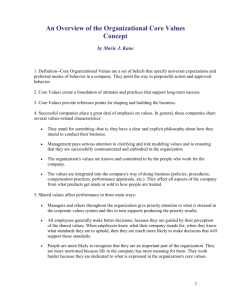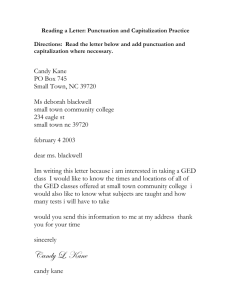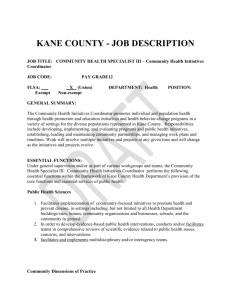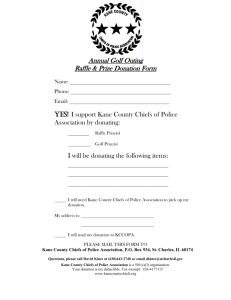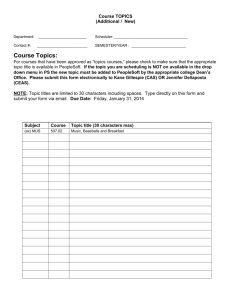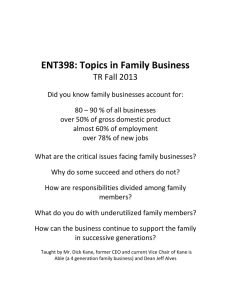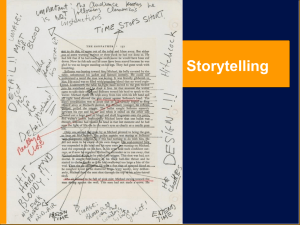Drop-In Course List - University of Washington
advertisement
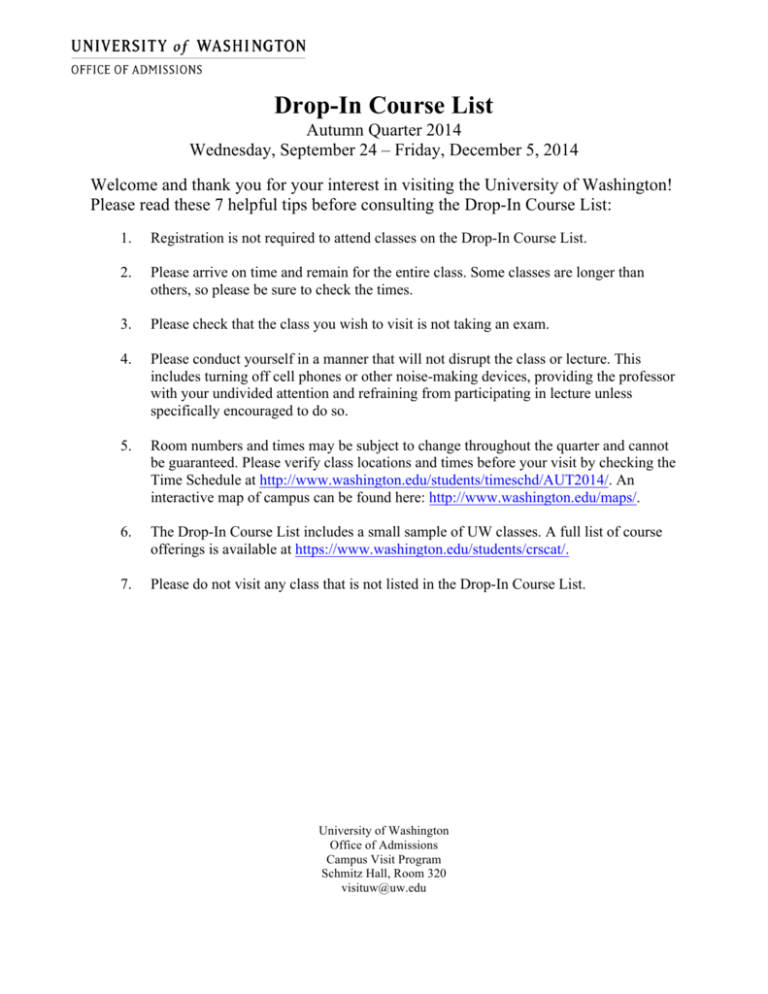
Drop-In Course List Autumn Quarter 2014 Wednesday, September 24 – Friday, December 5, 2014 Welcome and thank you for your interest in visiting the University of Washington! Please read these 7 helpful tips before consulting the Drop-In Course List: 1. Registration is not required to attend classes on the Drop-In Course List. 2. Please arrive on time and remain for the entire class. Some classes are longer than others, so please be sure to check the times. 3. Please check that the class you wish to visit is not taking an exam. 4. Please conduct yourself in a manner that will not disrupt the class or lecture. This includes turning off cell phones or other noise-making devices, providing the professor with your undivided attention and refraining from participating in lecture unless specifically encouraged to do so. 5. Room numbers and times may be subject to change throughout the quarter and cannot be guaranteed. Please verify class locations and times before your visit by checking the Time Schedule at http://www.washington.edu/students/timeschd/AUT2014/. An interactive map of campus can be found here: http://www.washington.edu/maps/. 6. The Drop-In Course List includes a small sample of UW classes. A full list of course offerings is available at https://www.washington.edu/students/crscat/. 7. Please do not visit any class that is not listed in the Drop-In Course List. University of Washington Office of Admissions Campus Visit Program Schmitz Hall, Room 320 visituw@uw.edu AFRAM 101 Introduction to African American Studies Professor Pittman Smith 120 M, W 8:30 - 10:20 History, culture, religion, institutions, politics, economics, arts, and psychology of peoples of African descent as developed from experience in both the old and new worlds. Multidisciplinary analysis of social life from a Black perspective as illustrated in selected historical and contemporary writings. AES 150 Introductory History of American Ethnic Groups Professor C. So Mary Gates 389 M, W 12:30-2:20 Survey of the history of African Americans, Asian Americans, Chicanos, and American Indians in the United States. ANTH 101 Exploring Sociocultural Anthropology Professor Michael Perez Savery 260 T, Th 10:30-12:20 Introduces perspectives from sociocultural anthropology on the diversity and the dynamics of collective human life. Examines how individual lives are shaped by broader social and cultural contexts, how people make meaning, and how power relations work. Introduces ethnography as a method for documenting and understanding social and cultural life. ANTH 203 Introduction to Anthropological Linguistics Professor Laada M. Bilaniuk Kane 210 M, W, Th, F 11:30-12:20 Linguistic methods and theories used within anthropology. Basic structural features of language; human language and animal communication compared; evidence for the innate nature of language. Language and culture: linguistic relativism, ethnography of communication, sociolinguistics. Language and nationalism, language politics in the United States and elsewhere. ARCHY 101 Exploring Archaeology Professor Matthew Taylor Gowen 301 M, T, W, Th 10:30-11:20 Introduces perspectives from archaeology on the long term history of the diversity and the dynamics of human life. Examines how archaeologists gather and use data and how that information is relevant to contemporary society. Concepts and methods introduced through readings focus around a theme that varies such as environmental issues, warfare, and migration. BIO A 201 Principles of Biological Anthropology Professor Matthew Taylor Miller 301 M, T, W, Th 8:30-9:20 Evolution and adaptation of the human species. Evidence from fossil record and living populations of monkeys, apes, and humans. Interrelationships between human physical and cultural variation and environment; role of natural selection in shaping our evolutionary past, present, and future. BIOL 118 Survey of Physiology Professor Amy Oakley Kane 120 M, T, W, Th, F 9:30-10:20 Human physiology, for nonmajors and health sciences students. CHEM 110 Introduction to General Chemistry Professor Colleen Craig Bagley 131 M, W, F 11:30-12:20 Introduction to general chemistry with an emphasis on developing problem solving skills. Covers basic concepts of chemistry along with the mathematics required for quantitative problem solving. For students without high school chemistry or with limited mathematics background. CHEM 238 Organic Chemistry Professor Niels Andersen Johnson 102 M, W, F 8:30-9:20 Second course for students planning to take three quarters of organic chemistry. Further discussion of physical properties and transformations of organic molecules, especially aromatic and carbonyl compounds. ECON 200 Introduction to Microeconomics Professor Dennis C O'Dea Guggenheim 220 T, Th 8:30-9:50 Analysis of markets: consumer demand, production, exchange, the price system, resource allocation, government intervention. ECON 201 Introduction to Macroeconomics Professor Dennis C O'Dea Guggenheim 220 T, Th 10:00-11:20 Analysis of the aggregate economy: national income, inflation, business fluctuations, unemployment, monetary system, federal budget, international trade and finance. GWSS 200 Introduction to Women Studies Professor Regina Lee Kane 210 M, T, W, Th 9:30-10:20 Feminist analysis of the construction and enforcement of gender differences and gender inequalities in various contexts. Emphasis on the intersection of race, class, sexuality, and nationality in the lives of women. Topics include feminist theory, motherhood, popular culture, sexual autonomy, racism, and activism in the United States, Asia, Latin America. GEOG 123 Introduction to Globalization Professor William Buckingham Guggenheim 220 T, Th 11:30-1:20 Provides an introduction to the debates over globalization. Focuses on the growth and intensification of global ties. Addresses the resulting inequalities and tensions, as well as the new opportunities for cultural and political exchange. Topics include the impacts on government, finance, labor, culture, the environment, health, and activism. HSTAM 111 The Ancient World Professor Sandra Joshel Smith 120 T, Th 10:30-11:20 Origins of Western civilization to the fall of Rome. HSTAM 235 Myths and Mysteries of the Middle Ages Professor Robin Stacy Smith 120 T, Th 8:30-10:20 Introduces the basics of the historian's craft by focusing on some enduring mysteries of the European middle agers, including bog bodies, druids, King Arthur, Robin Hood, the Templars, the Holy Grail, the Shroud of Turin, and Joan of Arc. JSIS 200 States and Capitalism: The Origins of the Modern Global System Professor Anand Yang Smith 120 M, W, F 12:30-1:20 Origins of the modern world system in the sixteenth century and its history until World War I. Interacting forces of politics and economics around the globe, with particular attention to key periods of expansion and crisis. LING 100 Fundamentals of Grammar Professor Clarissa Surek-Clark Architecture 147 M, W, F 8:30-9:20 Introduction to basic grammatical concepts and terminology. Specifically intended for students planning to take a foreign language or linguistics. LING 200 Introduction to Linguistic Thought Professor Laura McGarrity Architecture 147 M, W, F 2:30-3:20 Language as the fundamental characteristic of the human species; diversity and complexity of human languages; phonological and grammatical analysis; dimensions of language use; and language acquisition and historical language change. PHIL 100 Introduction to Philosophy Professor Andrea Woody Smith 120 T, Th 2:00-3:20 Major philosophical questions relating to such matters as the existence of God, the foundations of knowledge, the nature of reality, and the nature of morality. Approach may be either historical or topical. POL S 201 Introduction to Political Theory Professor Christine Di Stefano Smith 120 M, W, F 10:30-11:20 Philosophical bases of politics and political activity. Provides an introduction to the study of politics by the reading of a few books in political philosophy. Organized around several key political concepts, such as liberty, equality, justice, authority, rights, and citizenship. POL S 202 Introduction to American Politics Professor Rebecca Thorpe Paccar 192 T, Th 12:00-1:20 Institutions and politics in the American political system. Ways of thinking about how significant problems, crises, and conflicts of American society are resolved politically. POL S 203 Introduction to International Relations Professor Andrew Cockrell Paccar 192 M, W, F 12:30-1:20 The world community, its politics, and government. PSYCH 101 Introduction to Psychology Professor Lauren Graham Kane 120 M, T, W, Th, F 10:30-11:20 Surveys major areas of psychological science. Core topics include human social behavior, personality, psychological disorders and treatment, learning, memory, human development, biological influences, and research methods. Related topics may include sensation, perception, states of consciousness, thinking, intelligence, language, motivation, emotion, stress and health, cross-cultural psychology, and applied psychology. PSYCH 200 Comparative Animal Behavior Professor Michael Beecher Kane 220 M, T, W, Th, F 1:30-2:20 Research methods and findings of comparative animal behavior, their importance to an understanding of human behavior; rationale for study of behavioral differences/similarities between animal species, behavior viewed as part of adaptation of each species to its natural habitat. SOC 201 Introductory Topics in Sociology Professor Susan Pitchford Kane 110 M, W, F 10:30-11:20 Selected introductory topics of contemporary interest. ESS 101 Introduction to Geological Sciences Professor Terry Swanson Kane 120 M, W, F 1:30-2:20 Survey of the physical systems that give the earth its form. Emphasizes the dynamic nature of interior and surface processes and their relevance to mankind and stresses the value of rocks and earth forms in the understanding of past events. A course with laboratory for non-science majors. ESS 102 Space and Space Travel Professor Erika Harnett Johnson 102 M, W, F 11:30-12:20 Explores the sun, solar storms, observations from space and from Earth; Earth's space environment, radiation belts and hazards, plasma storms and auroras, rockets and propulsion, human exploration efforts, societal impact, planetary systems and resources, and project highlighting space and its exploration. ESS 106 Living with Volcanoes Professor Michael Harrell Kane 110 M, W, F 11:30-12:20 Explores volcanoes and volcanic eruptions on Earth and in the solar system. Examines how volcanoes work and how they affect the environment, life, and human societies. Illustrates principles using local examples of recent volcanism and ancient examples of mega-eruptions. Evaluates the possibility of predicting future eruptions. ATM S 101 Weather Professor Darren Wilton Kane 210 M, T, W, Th 10:30-11:20 The earth's atmosphere, with emphasis on weather observations and forecasting. Daily weather map discussions. Highs, lows, fronts, clouds, storms, jet streams, air pollution, and other features of the atmosphere. Physical processes involved in weather phenomena ATM S 111 Global Warming: Understanding the Issues Professor Lyatt Jaegle Kane 220 T, Th 11:30-1:20 Includes a broad overview of the science of global warming. Discusses the causes, evidence, future projections, societal and environmental impacts, and potential solutions. Introduces the debate on global warming with a focus on scientific issues. ATM S 211 Climate and Climate Change Professor Qiang Fu Kane 110 M, T, W, Th 12:30-1:20 The nature of the global climate system. Factors influencing climate including interactions among the atmosphere, oceans, solid earth, and biosphere. Stability and sensitivity of climate system. Global warming, ozone depletion, and other human influences. ENVIR 100 Environmental Studies: Interdisciplinary Foundations Professor Elizabeth Wheat Architecture 147 T, Th 2:30-3:50 Introduces environmental studies through interdisciplinary examination of the ethical, political, social, and scientific dimensions of current and historical environmental issues. Integrates material from different disciplines, and applies insights and methods to actual problems and situations at scales from the local to the global. OCEAN 101 Oceanography of the Pacific Northwest Professor Mikelle Nuwer Mary Gates Hall 389 M, W, F 11:30-12:20 Introduces the fundamental principle of oceanography by focusing on the waters that surround us - the Washington coast and Puget Sound. Investigates the geologic history of the Pacific Northwest, and the physics, chemistry, and biology of coastal waters using case studies.
